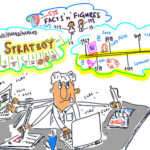Expecting is the greatest impediment to living. In anticipation of tomorrow, it loses today. – Seneca

While the picture says that it was taken on the day of the recital itself, I always had trouble focusing the day before, anticipating a concert or performance. The result, not much got done on the day before the show. The quote, realized.
What does that mean?
This is a bit of ancient wisdom regarding time management. It has been seen in many cultures throughout time. In this version, expectation is held up as a terrible waste of our lives. It is also called the anticipation of tomorrow in the quote.
Anticipation seems to be a natural human condition. However, this quote is not addressing normal anticipation, but an excess of it. It is discussing a form of paralysis caused by too much anticipation. If you are expecting to win the lottery tomorrow, it might be a little hard to show up at work, right?
The quote finishes with the cost of the anticipation of tomorrow, the loss of today. What might that person who was anticipating the lottery win have accomplished in the day before the drawing? How much would likely actually get done? That is the loss of which the quote speaks.
Why is staying focused on today important?
I hope the prior paragraphs helped you understand the perils of not keeping your focus on the present, on today. The things to get done today are rarely as exciting in reality as we might have hoped that they would be when we were thinking about them yesterday.
In short, the shiny wore off when it got here. Rather than deal with the disappointment, we went on to the next tomorrow. And then the next. Meanwhile each subsequent ‘today’ languished. And so much that could have been done was not, and the day was lost.
By staying focused on today, we can let tomorrow be tomorrow. And we can do today what needs to be done today. It sounds so easy, and so logical. But everyone I know has anticipated tomorrow and lost today at least once. How about you, have you done this too?
Staying focused allows us to see what needs to be done, instead of being blinded by fantasies of how tomorrow will be. We need to keep our eyes on the prize, and that prize is the present. Nothing else comes close. We can plan for the future and learn from the past, but today is what is truly important.
Where can I apply this in my life?
It can be hard, especially on the day before a big event. But the day before a big event is usually one of the most difficult. It is typically the day when all the last minute things go wrong, or need attention. At least that’s how it always works for me.
From earliest childhood through the present day, I have to remind myself to stay focused on the task at hand. So far in writing this blog post, I have wandered off several times to do other things, including preparing for something I am anticipating having to do tomorrow. Oops!
Some people have better self-discipline than I do, and good for them! They may not have to worry about this quote quite as much as the rest of us. However people like me still struggle with this, even though I know better, and have for many years.
How often do you allow yourself to be distracted by expectations for, or by the anticipation of tomorrow? It can take more than just will power for those who have difficulty. It takes a plan, some discipline and the development of a habit or two.
I try to stay focused, and remind myself to set aside anticipation of and anxiety for tomorrow. Any time I catch myself, I take a moment and try to regain my perspective, then get back to what I should be doing. For those of us with ADD, it is a life-long struggle.
How often do you find yourself in the situation described in the quote? Are there certain things that are more likely to trigger your expectations or anticipation for what is to come? Are you easily distracted, or does it take something significant to get you off task?
Big events were mentioned as one possible source, are there specific kinds of events which are more likely to cause you to lose today in anticipation of tomorrow? Grab some paper and write down the last few times you lost time due to anticipation or the expectation of some future event.
How does that list look? Is there a pattern? Can you think of ways to recognize that you have become distracted? Next, can you think of ways you might be able to interrupt the pattern of behavior and get yourself back on task? It might be worth writing some of these ideas down, right?
Now that you have examined yourself and gained some awareness of your patterns of behavior, the next question is “What will you do about it?” But that isn’t something I can help you with all that much, as everyone will have a unique set of circumstances.
If you start with conscious incompetence, that is recognizing that you have messed up, and then return to your task, you will have a starting point. Each time you catch yourself, you become more aware of what is happening. Each time you return to the task at hand, you make your habits a little stronger.
From: Twitter, @philo_quotes
confirmed at : http://www.brainyquote.com/quotes/quotes/l/luciusanna121396.html
Photo by edenpictures







Good stuff.
Thanks for taking the time to leave a comment, and for being so kind.